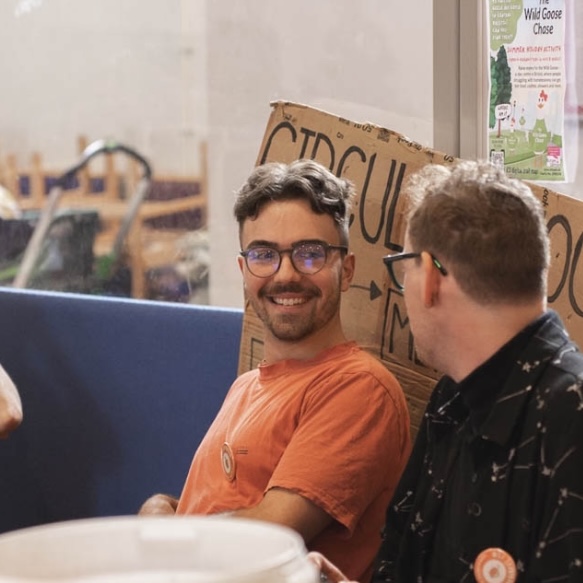Introducing Our Food Waste Collection and Living Compost Service in Bristol
- Alex Montgomery
- Nov 18, 2024
- 4 min read
Updated: Dec 26, 2025
At Generation Soil, we’re excited to introduce our brand new food waste collection and composting service in Bristol, designed to turn urban food waste into living compost that regenerates urban soil health.
This project is a key step in our wider mission to build circular food systems that work with nature rather than against it. Cities generate huge volumes of food waste, while soils continue to degrade. We see these not as separate problems, but as two sides of the same broken system.
This service exists to reconnect them.

What Is a Circular Food System?
A circular food system reimagines how food, waste, and soil relate to one another.
In today’s dominant linear system, resources are extracted, food is produced, consumed, and then discarded. Over one-third of all food produced globally is wasted. In the UK alone, more than 6 million tonnes of food waste are thrown away each year, much of it ending up in landfill where it releases methane, a potent greenhouse gas.
A circular food system flips this logic.
Instead of treating food waste as rubbish, it treats it as a resource. At Generation Soil, food waste is collected, composted, and returned to the land as living compost. That compost feeds soil life, supports biodiversity, and helps grow fresh food locally.
This is the same principle explored in the blog post The Food Waste Hierarchy: Turning Waste into Soil and Community, where composting serves as a regenerative alternative to landfilling.

What Is Living Compost?
Not all compost is created equal.
Living compost is biologically active. It contains bacteria, fungi, nematodes, protozoa, and microorganisms that form the soil food web. These organisms break down organic matter, unlock nutrients, improve soil structure, and build long-term fertility.
This is very different from the compost-like materials produced by large-scale municipal systems, which are often heat-treated, sterilised, or contaminated with plastics. While those systems divert waste from landfill, they rarely prioritise soil biology or food-growing quality.
Our approach is hyper-local and intentional. We produce compost slowly, in small batches, designed for food-growing and ecological regeneration. You can learn more about why this matters in What Generation Soil Does: Turning Food Waste into Living Soil.
How We Turn Food Waste into Living Compost
Our composting process is deliberately simple, local, and biology-led.
1. Collection and Careful Sorting
We collect food waste directly from households, businesses, and community organisations across Bristol. By working closely with members, we maintain a high-quality input stream free from contamination.
This relationship-based approach underpins the Bristol Living Compost Project.
2. Composting with Carbon Balance
Collected food waste is blended with wood shavings and bark sourced from a local timber yard, using a carefully balanced 1:1 ratio of food waste to carbon material. This balance supports aerobic decomposition and microbial growth.
The process is monitored for moisture, oxygen, and temperature to support beneficial life rather than industrial speed.
3. Living Compost Maturation
Over several weeks, the compost matures into a biologically complete material rich in organic matter and soil life. Once ready, it is returned to members or donated to local growing projects across the city.
This keeps nutrients local and closes the loop between food, waste, and soil.
Why Keep Composting Local?
Centralised waste systems require transport, energy, and scale. Local composting reduces emissions, strengthens community resilience, and rebuilds relationships with soil.
This decentralised approach is explored further in The Food Waste Hierarchy blog post and underpins our wider Living Soil & Regeneration ethos.
When compost stays local, so do the benefits.
How You Can Get Involved
There are several ways to be part of this system.
Join the Food Waste Collection Service
Sign up to have your food waste collected and transformed into living compost. This is the easiest way to reduce your waste footprint while actively regenerating soil.
Learn more on the Food Waste Collection page.
Use or Donate Compost
Members can use living compost in their own gardens, allotments, or planters, or donate it to support community food-growing projects across Bristol.
This shared flow of nutrients strengthens the entire city.
Learn, Volunteer, or Collaborate
From composting workshops to food-growing sessions, we run hands-on learning opportunities that reconnect people with soil. These experiences often shift how people think about waste, health, and the living world.
This human connection is explored more deeply in The Unknown Impact of Soil Health on Wellbeing (blog post).
A Shared Mission for a Soily Future
By joining this service, you’re not just managing waste. You’re participating in a living system that restores soil, supports food security, and builds community resilience.
Bristol has the potential to become a model for how cities regenerate rather than extract.
If you’re ready to close the loop on food waste and help rebuild living soil, join us.
Sign up to our mailing list and get your FREE copy of our Guide To Compost, Microbes, & Regeneration
Stay soily,
Alex 🤠




Hey 👋 I would love to have a quick chat with the store owner, kindly inbox me now! It very urgent!...thank you
I'll be Available to Assist you With Boosting your WEBSITE uniqueness for SEO Optimization and Searching Bar on Google
(( https://www.fiverr.com/s/Ldq9mGL )) ping me up to My FIVERR FREELANCING Profile
It's kinda a Pleasure having you Onboard here With me